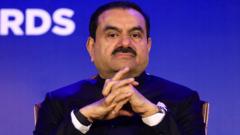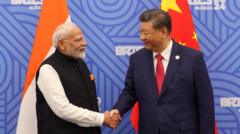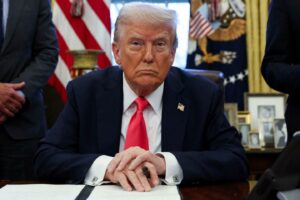Despite recent bribery allegations against the Adani Group, industry experts believe that India’s ambitious clean energy targets will remain largely unaffected. The Indian government aims to source 500 gigawatts (GW) of renewable energy by 2032 amidst its global climate commitments. While the Adani Group's expansion may experience temporary setbacks, analysts contend that India's clean energy momentum will continue to thrive, supported by substantial investments and a burgeoning market for renewables.
Bribery Claims Against Adani Group: Implications for India's Green Energy Initiatives

Bribery Claims Against Adani Group: Implications for India's Green Energy Initiatives
US legal challenges potentially impacting the Adani Group's role in India's renewable energy expansion.
The Adani Group, a key player in India's renewable energy sector, has recently faced fraud charges in the United States. Nevertheless, leaders within the industry maintain that these legal challenges will not derail India's overarching clean energy goals. India has pledged to achieve 500 GW of renewable energy capacity by 2032, crucial for combating climate change, and the Adani Group is expected to contribute approximately 10% of this capacity.
While it is true that the recent legal troubles might cause a temporary delay in the Adani Group's projects, analysts predict that the impact on India's renewable energy targets will be minimal. India has shown impressive growth in its clean energy infrastructure over the past decade, with non-fossil fuel sources constituting around 45% of its nearly 200GW power generation capacity, according to the International Energy Agency.
Gautam Adani, the founder of the Adani Group, has committed $100 billion to India's energy transition and aims to scale the group's renewable energy output from nearly 11GW to 50GW by 2030. The group's flagship project, the Khavda facility in Gujarat, is being heralded as the world's largest clean energy plant. However, the US allegations suggest that the group may have engaged in questionable practices to secure contracts for these projects.
The repercussions of the indictment are already affecting the Adani Group's financial standing. A significant bond offering in the US was cancelled shortly after the indictment was made public, and French energy giant TotalEnergies has announced a halt to new investments in the company. Additionally, major credit agencies have revised their ratings of Adani Group entities, raising concerns about access to funds for their projects.
Despite the current climate, some analysts see a silver lining. They argue that reduced funding for the Adani Group could usher in opportunities for its competitors, such as Tata Power and others, who are also ramping up their renewable energy activities. Furthermore, they emphasize that the demand for clean energy in India continues to exceed supply, ensuring that investments in the sector remain strong.
Political and bureaucratic obstacles within India pose a more significant risk to the expansion of its renewable energy ambitions than the current legal troubles plaguing the Adani Group. Experts highlight state-level regulations as barriers to faster deployment of renewable energy projects, underscoring the need for reforms in the tendering process to encourage transparency and foster competition.
As the situation evolves, the Indian clean energy landscape remains vibrant and competitive, with industry leaders expressing confidence in meeting the country's renewable energy goals despite ongoing challenges.
While it is true that the recent legal troubles might cause a temporary delay in the Adani Group's projects, analysts predict that the impact on India's renewable energy targets will be minimal. India has shown impressive growth in its clean energy infrastructure over the past decade, with non-fossil fuel sources constituting around 45% of its nearly 200GW power generation capacity, according to the International Energy Agency.
Gautam Adani, the founder of the Adani Group, has committed $100 billion to India's energy transition and aims to scale the group's renewable energy output from nearly 11GW to 50GW by 2030. The group's flagship project, the Khavda facility in Gujarat, is being heralded as the world's largest clean energy plant. However, the US allegations suggest that the group may have engaged in questionable practices to secure contracts for these projects.
The repercussions of the indictment are already affecting the Adani Group's financial standing. A significant bond offering in the US was cancelled shortly after the indictment was made public, and French energy giant TotalEnergies has announced a halt to new investments in the company. Additionally, major credit agencies have revised their ratings of Adani Group entities, raising concerns about access to funds for their projects.
Despite the current climate, some analysts see a silver lining. They argue that reduced funding for the Adani Group could usher in opportunities for its competitors, such as Tata Power and others, who are also ramping up their renewable energy activities. Furthermore, they emphasize that the demand for clean energy in India continues to exceed supply, ensuring that investments in the sector remain strong.
Political and bureaucratic obstacles within India pose a more significant risk to the expansion of its renewable energy ambitions than the current legal troubles plaguing the Adani Group. Experts highlight state-level regulations as barriers to faster deployment of renewable energy projects, underscoring the need for reforms in the tendering process to encourage transparency and foster competition.
As the situation evolves, the Indian clean energy landscape remains vibrant and competitive, with industry leaders expressing confidence in meeting the country's renewable energy goals despite ongoing challenges.























